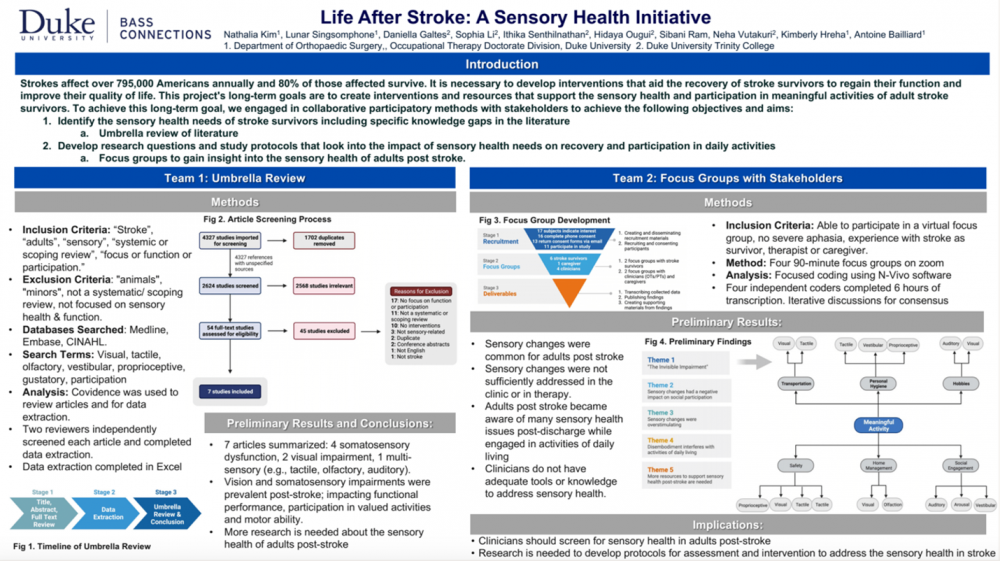Sensory Health in Post-Stroke Adults
Project Team
Team profile by Antoine Bailliard and Kimberly Hreha
This project explored how changes in the sensory health of adults post-stroke affect their participation in meaningful activities of daily living that are important for positive mental and physical health. The specific aims were to 1) perform an umbrella review of the literature exploring sensory changes in adults post-stroke to identify knowledge gaps; 2) collaborate with community stakeholders to identify how changes in sensory health experienced by adults post-stroke affect their participation in meaningful activities; and 3) collaborate with community stakeholders to design research to fill gaps in knowledge regarding the sensory health needs of adults post-stroke.
To meet the first aim, a four-student subteam participated in an umbrella review of research on the sensory health of adults post-stroke. The team used Covidence software to assess 2,624 abstracts identified by a librarian to determine whether they met the inclusion criteria for the review. Each abstract was reviewed by two team members and any conflicts in opinion were resolved by the team leader. The team repeated this process with the 54 full-text abstracts that were eligible, resulting in seven studies that were included for data extraction. Data extraction is ongoing and preliminary analyses found studies reporting prevalent vision and somatosensory impairments among stroke survivors, impacting functional performance and participation in valued activities.
To meet the second aim, another four-student subteam performed a total of four focus groups over Zoom with two cohorts of stakeholders. The first stakeholder cohort consisted of six adults post-stroke. The second stakeholder cohort consisted of five clinicians in stroke rehabilitation (occupational therapy and physical therapy) and a caregiver of an adult post-stroke. The first round of focus groups explored whether participants experienced changes in each of their sensory systems post-stroke including how changes affected their participation in meaningful activities. The second round of focus groups explored knowledge gaps and discussed potential research studies to fill important gaps in knowledge. Focus group audio recordings were transcribed and the team engaged in three rounds of analyses using NVivo qualitative analysis software.
Our analyses revealed a significant gap in awareness and understanding regarding the sensory changes that occur post-stroke. Adults post-stroke reported many significant sensory changes that affected most areas of meaningful participation including social participation, moving around the community, cooking, eating and home management. Participants reported feeling overstimulated at times and referred to their sensory changes as “invisible” impairments that were easily missed yet essential to target in intervention. Participants unanimously agreed that more resources were needed for caregivers and stroke survivors on this topic and resources for clinicians to effectively assess and address sensory impairments that prevent participation in meaningful activities of daily living.
Life After Stroke: A Sensory Health Initiative
Poster by Nathalia Kim, Lunar Singsomphone, Daniella Galtes, Sophia Li, Ithika Senthilnathan, Hidaya Ougui, Sibani Ram, Neha Vutakuri, Kimberly Hreha and Antoine Bailliard

